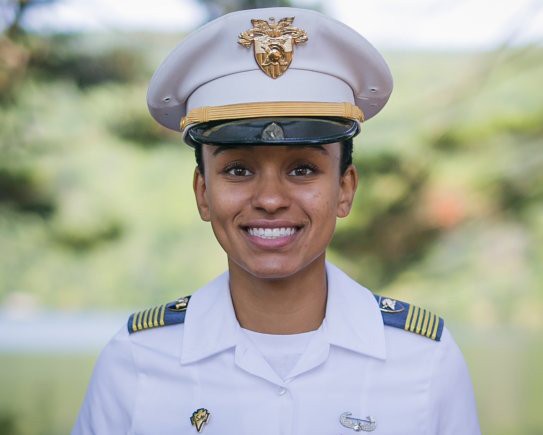
WEST POINT, N.Y. (AP) — Making history.

Simone Askew is making history as the first black woman to lead the Long Grey Line at the U.S. Military Academy. But first, she’s joining a long, grimy line of cadets ending basic training with a traditional 12-mile (19-kilometer) march Monday.
The 20-year-old international history major from Fairfax, Virginia, assumes duties this week as first captain of the 4,400-member Corps of Cadets. That’s the highest position in the cadet chain of command at West Point.
The Pointer View, the civilian enterprise newspaper of West Point also notes that Askew leads 1,502 cadets as the Regimental Commander of Cadet Basic Training II.
Pat Locke, one of two black women in the first class of women to graduate from West Point in 1980, says Askew is a terrific role model.
Pam Askew adds that her daughter is a natural leader.
Brig. Gen. Steve Gilland says Askew exemplifies the academy’s values of duty, honor and country. “Her selection is a direct result of her hard work, dedication and commitment to the Corps over the last three years,” Gilland said in a West Point news release. “I know Simone and the rest of our incredibly talented leaders within the Class of 2018 will provide exceptional leadership to the Corps of Cadets in the upcoming academic year.”
Outside of the curriculum, Askew is a member of the Army West Point Crew team and developing leaders as the Cadet-in-Charge of the Elevation Initiative. She is a graduate of Air Assault School, an EXCEL Scholar, a member of the Phi Alpha Theta Honorary National History Society, a recipient of the Black Engineer of the Year Award for Military Leadership, and holds the highest female Recondo score during Combat Field Training II for the class of 2018.
Askew last year served as well as student organizer for the Joint Service Academies Mass Atrocity Prevention Symposium. That symposium in Washington D.C. was focused on giving
military service academy cadets and midshipmen the opportunity for advanced discussions about the causes, contexts and consequences of atrocity with experts in the field, allow them an opportunity to present research they have done on the history and study of the Holocaust and other genocides, and to draw lessons from the past and learn about recent studies by peers that lend insight for creative means of preventing atrocities.
Overall, according to West Point’s Center for Holocaust and Genocide studies, “the intent is to produce a greater understanding of atrocity detection and prevention and to encourage discussions about the consequences of atrocities while instilling in our country’s future leadership a deep sense of history, ethics, and responsibility.”




